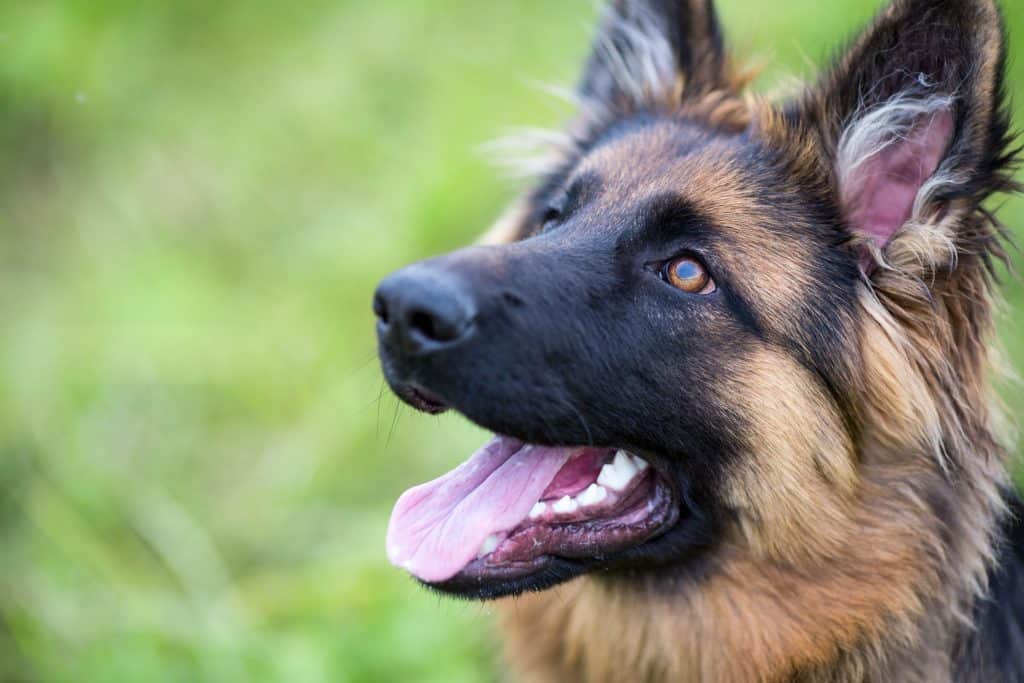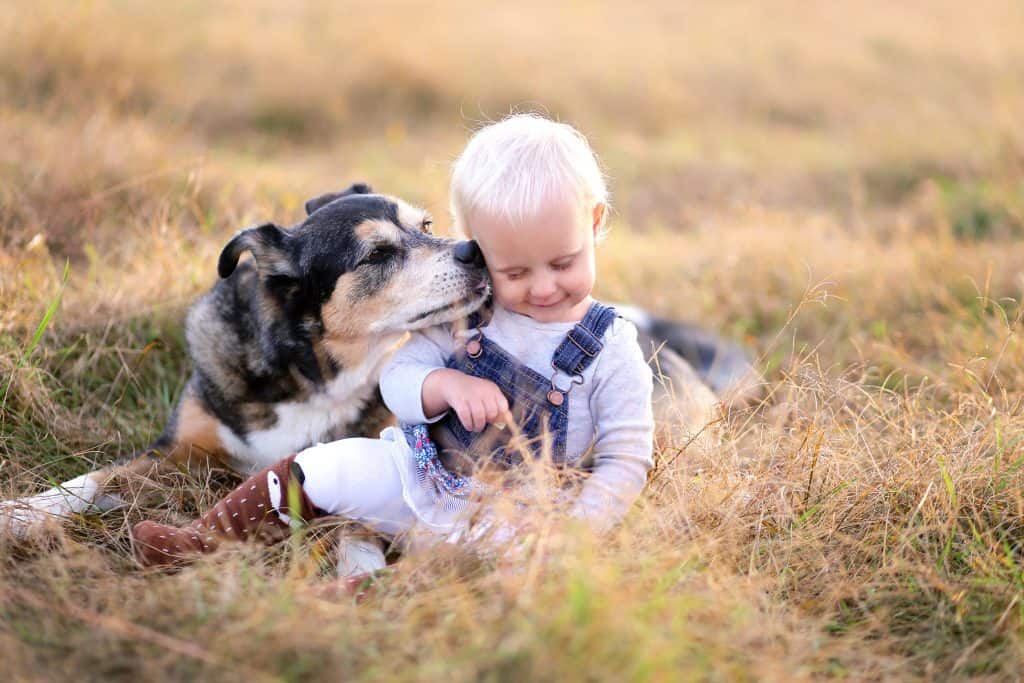Are German Shepherds Good with Kids? A Guide for Parents

I would love to have a family pet, something that loves my children and my children
Are German Shepherds good with kids? German Shepherds have a loving nature, just like any other breed of dog, and they are great with kids
Now that you’ve got the short-version answer, it’s time to really talk about the good and the potential bad that you should be aware of before you decide to adopt one of these big breeds into your home.
German Shepherd Qualities That Work Well with Children
German Shepherds have a bunch of positive qualities about them that work incredibly well with children.
Every parent wants their child to be safe. Even though I myself am not a parent yet, I’m thinking about what I want to do to ensure my future family’s safety, such as neighborhoods to live in, security systems, and rules that I want to teach my children so they can be safe wherever they are.
Have you ever seen videos of animals- in this case, dogs- saving their owner or a child? There are several stories of German Shepherds protecting people: saving them from snakes, protecting them from robbers, or detecting gas leaks and warning their family.
There’s even a story about a dog who sacrificed his life to save his soldier from a bomb! Gets me teared up every time.
For decades, German Shepherds have worked as police dogs, like public enforcement (the dogs that chase down the bad guys), substance detectors (the dogs that use their super noses to find drugs), or cadavers (dogs who help find dead bodies).
With this prestigious resume of experience, they know how to protect others. They’re the best guard dog breed, and if they have the ability to do all of these incredible things as police dogs, they’ll definitely be able to protect your family.
German Shepherds are extremely loving, and they are quick to befriend others, including babies, toddlers, and young children. It’s important to keep in mind that other factors can play into your dog being friendly, like being raised in a family environment or being bred by a responsible breeder.
One thing I’m very familiar with is a child’s love of grabbing at things. My little nephew loves to grab and tug on shirts, hair, glasses, jewelry, and even skin (which is just as painful as you think it is). What if they’re around a German Shepherd? Will this behavior get them hurt unintentionally?
German Shepherds are just as tolerant as they are friendly. Grabs or tugs at their fur, ears, or tails are things that they deal with quite well. Despite this, just as it’s important to teach your dog to respect your kids, teach your kids to respect your dogs.
As your child grows up, so does their energy level. German Shepherds are a good breed when it comes to playing because they are as tireless as your kids. With their high-level energy, they will be able to play with your children for a long time before they get tired.
German Shepherds are incredibly intelligent and capable, and they also have high trainability, which means that they can learn and adapt to how you would like them to behave.
German Shepherds, like every breed of dog, are very loyal and kind. They typically are a breed with a calm and caring nature. With proper training, you’ll be able to have a dog who will love your kids just as much as you love them!
Are German Shepherds Good with Infants?
During the first few months of their life, infants aren’t able to do a whole lot aside from eating, sleeping, crying, and requiring multiple diaper changes (sometimes all at once if you’re lucky). With a gigantic breed like German Shepherds, would they be a good fit? Would your infant be safe around them?
The answer is another yes! With the tips that I provide below, your German Shepherd will still be obedient and kind to your infant. With that, there are some extra steps that you should take to ensure your dog is responsible with your baby.
If you are expecting a baby, you should start training your German Shepherd before they are born. Wrap a doll in a blanket and teach your dog how they should act around it.
You should also train your dog how to act around your baby when it is in a stroller, a cradle, or on the floor, since they will probably be encountering these scenarios. Use this time to train them to not jump or play around.
It’s not a good idea to surprise your dog with a new baby. You also don’t want them to show any signs of jealousy because you’re spending more time caring for your newborn. Because German Shepherds require a lot of attention, they wouldn’t like to go from a lot of attention to significantly less attention.
Take the time before the baby comes to adjust your dog to having a baby in the house. Introduce them to the sounds, smells, and sights of a baby. Gradually adjust the time you spend with your dog so there won’t be a huge change for them when you bring home your newborn.
If done ahead of time, whenever the baby does come, your dog will be prepared, and it’ll be less stress on you.
Temperaments That You Should Be Aware Of

German Shepherds, just like any breed of dog, aren’t perfect. Yes, there are a lot of good things about them, but each breed has aspects of their personality that a potential owner needs to be prepared to deal with and handle.
Especially if you’re considering your dog growing up with your children, you need to know what you’ll be getting into so your child doesn’t get hurt due to ignorance.
German Shepherds have a delayed puppyhood, which means that they don’t grow out of it until about 3 years old. During this period, they are still learning spatial awareness and they’re learning more about their large size and strength.
By three years, a female German Shepherd’s height on average is between 22 to 24 inches and weighs between 50 to 70 pounds while a male’s height is between 24 to 26 inches and weighs between 65 to 90 pounds. Next to a three-year-old child at half that weight, your dog is gigantic.
During this puppyhood era, your puppy might accidentally hurt your child by a too-powerful pounce or barrel. Despite this, be assured again that German Shepherds have high trainability, so they can learn to be child-friendly. But also be aware that you can’t expect your child to come out of this stage of life bump-free if they have a canine best friend.
While it’s a good thing that German Shepherds have a deep loyalty to their owners, they also have a tendency to be leery of humans or other dogs they are unfamiliar with, and they may get aggressive.
Whether it’s newborns or young children, you should always supervise. Even if you have an obedient dog, you never know when an accident might happen, and you need to be prepare to break up a situation before it turns sour.
Tips for Raising a German Shepherd
If this will be your first time owning a German Shepherd, especially if this is your first time owning a dog, then I’ve got a few tips for raising one.
Early Socialization: Let your pup spend time with others when they’re young. For example, you can enroll them in a puppy school. Through this socialization, your puppy can learn that being around other dogs and humans can bring a positive experience. They can also learn at this undeveloped age what behaviors are acceptable around other dogs and humans. Giving German Shepherds proper socialization at a young age will let them develop the loving behavior you would want for your children.
Another important reason to socialize a German Shepherd at an early age is because, if they aren’t, they can become a danger to your children. Proper training and socialization will cause your dog to treat children other than your own with the same loving kindness as if they were.
Early and Consistent Training: If your German Shepherd is going to be spending a lot of time with your children, they can’t learn good behavior just by example from other dogs; they need a solid foundation of obedience through your training so they know clearly what is right and what is wrong. You can choose to train them yourself or have a professional do it- whatever it is your comfortable with. Some basic voice commands are “sit,” “stay,” “stop,” “lay down,” or “come.”
Regular Exercise: German Shepherds have a high level of energy, which means that they need daily exercise. Basic, but useful ways of exercise are with dog toys, bones, or playing with them yourself. If your kids also have high energy, they can play with each other, and they won’t tire out so easily. You could also choose to have an exercise buddy and take them out for an evening run.
If you live in a small apartment or a place that doesn’t allow for much room inside or outside, then you might want to reconsider getting a German Shepherd. Cooping them inside all the time without exercise can result in frustration or releasing excess energy in ways that can be hazardous to them, to you, and your children.
Not to mention, having kids while living in a one bedroom apartment and dropping a giant dog might not be the smartest idea.
If you still want a dog, consider getting a smaller breed, as they would be a better fit for a smaller apartment and would love your kids just the same.
Regular Mental Stimulation: German Shepherds also need regular mental exercise. They are task-oriented dogs, so they enjoy staying busy or being given something to do. Give them things to chew on (toys, bones, ropes, balls, etc.); it will exercise their mouth and their brain.
A good way to exercise your dog both physically and mentally is by playing with them. They’ll be able to burn energy, keep their mind occupied and stimulated, and as a bonus, they will be able to get socialization!
Establish Dominance and Authority: German Shepherds, by nature, are dogs that like to lead, and their personality makes them controlling towards their followers to ensure they’re doing what they want them to do. For effective training and obedience, you as the owner need to be able to show authority towards your German Shepherd so they understand that you are the one in charge. It is also important that you are capable of restraining them if the situation calls for it since you’ll be dealing with up to 90-pounds of fur and muscles.
Never attempt to do that through negative or forceful ways, such as yelling or hitting. It will not benefit you or your dog, and it will make things worse. If you want to earn your dog’s respect and loyalty, firmly establish rules and boundaries, but do it in a way that’s kind, caring, and patient.
Time, Effort, and Sacrifice: That should really say it all. Taking care of a dog, especially as tasking as a German Shepherd, is a very big responsibility, and as the owner, it’s going to require a LOT on your part. Before you commit to getting one, it’s super important that you figure out if you can continue to devote that commitment through the rest of your dog’s life, which is 7 to 10 years.
To put it bluntly, whatever treatment you give your German Shepherd will be what you get in return. If you want a good, obedient dog, then you need to know for sure that you are able to give them all that is require for them to become one.
The Dangers of Improper Upbringing
German Shepherds are not a breed that can be isolated in a backyard or deprived of attention or touch (of course, no breed should be treated that way).
Even if you leave them for a while to go to work or spend time with your family, your dog will not take it well, and it will result in behavior issues, including, but not limited to:
- digging,
- barking,
- jumping and bolting,
- separation anxiety,
- destructive behavior,
- overly defensive/protective behavior
- and fear aggression.
A child that isn’t given proper love or attention from their parents can cause them to develop serious and unfortunate behavioral and mental challenges. A dog can be put in a similar situation if they are raised by an owner who doesn’t give them proper time, love, and training.
Bottom Line
So, are German Shepherds good with kids? They do great with kids. The biggest factor that will affect that love will be the way you raise your dog. Commitment, time, and devotion will result in an awesome, well-behaved dog.
Just like a child, a dog needs attention, love, and they need to understand what is okay and what is not. If you are prepared to do that, then you should be able to do well with raising a German Shepherd within your family.
I just stress that you give your German Shepherd- or any dog you decide to get- proper training and attention. Understand their personality and temperament. Know how to address any potential or current problems with your dog so you can work to fixing it instead of letting it become a serious problem.
Related Questions
What is fear aggression, and how do I know if my dog has it? In a concise explanation, fear aggression is a dog’s instinct to fight because they’re afraid. Dogs are ‘fight or flight’ creatures; if they can, they will run, but if not, they will fight to protect themselves, even if the thing they are fighting isn’t a threat.
Dogs exhibit signs that may mean they have adopted fear aggression:
- Body postures that are connected with fear while retreating, such as cowering, licking their lips, and baring teeth.
- If your dog is cornered or doesn’t have anywhere to run, they might resort to growling, barking, snapping, or biting to try and get the supposed threat to go away.
- A dog with fear aggression might retreat when someone approaches them, then run after them and nip at the person as they walk away.
- Dogs who are afraid deliver shallow, rapid bites to drive the threat away instead of deal serious physical harm.
The most common ways a dog can develop fear aggression is if they aren’t given proper training or if they weren’t given good socialization as a puppy. Fear aggression can be made worse if an owner uses punishment-based techniques on the dog. If you think your dog has fear aggression, serious, but humane training is needed to help your dog overcome this behavior.
Are German Shepherds good with cats? They can be! There’s the stereotype that dogs and cats are opposites and don’t get along at all, but that’s not the case. Because of their high intelligence, a German Shepherd can learn from their owners’ cues who to like and trust, and that includes cats.

